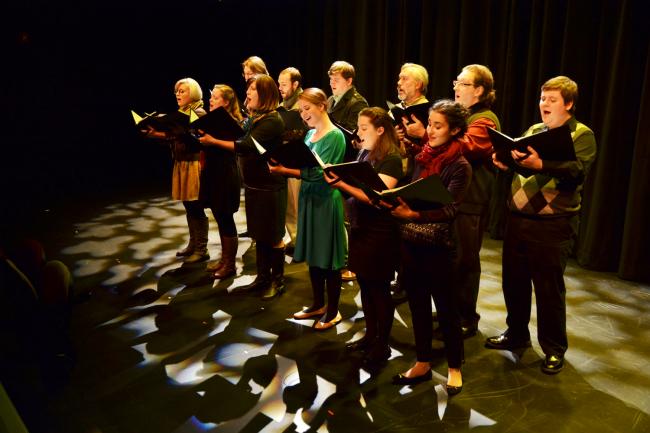The Inverse Opera encores their intimate and theatrical rendition of Handel’s Messiah
Inverse Opera's performing Handel's Messiah.
Sat, 12/06/2014
By Amanda Knox
Remember those kids in high school who took part in all the choir and theatre productions and sang show tunes and choral harmonies from classroom to classroom between periods? Ever wonder what happened to them? What they might be up to five, ten, or twenty years later if they were to trade those locker-lined hallways for, say, the local pub? That’s the Inverse Opera.
Last year, when the troupe of twelve singers and performers was only two years old, they coproduced with Taproot Theatre a theatrical version of Handel’s Messiah just in time for the holidays and were so successful in selling out seats and charming audiences that Taproot asked them to perform again this year.
Messiah (1742) is an oratorio by George Frideric Handel covering the whole story of Jesus, from the prophesy of his birth, through his crucifixion and ascension, to the prophesy of his second coming. It has been performed since the 19th Century as a grandiose choral piece, but was originally intended as a small, intimate performance. As written, its three-part structure resembles an opera, but it is not meant as a dramatic piece involving characters and choreography.
So the Inverse Opera’s rendition of Messiah does precisely the opposite of what any other modern production is doing: they’ve returned to Handel’s original scope, but dramatized it. Inverse Opera, indeed.
This both works and doesn’t work. The Isaac Studio at Taproot Theatre is a black box with seating rising away from a ground-level proscenium stage. From any seat in the house your going to be up close to the performers, privy to every gleeful smile and ghastly grimace that are sometimes perfectly measured to the distance between performer and viewer, and sometimes out of proportion on the side of too much.
The setting is abstract, relying only on the most basic of props: a chair, the curtain, the performers’ own music binders. The choreography within this simple space is truly magical and a strength of the production. You will be surprised and charmed by the ingenuity of how the entirety of the space is taken advantage of.
Four soloists (soprano Shirley Traverse, alto Hayley Baudrau Gaarde, tenor Ben Sasnett, and bass Eric Jensen) largely bear the burden of dramatizing the production. They portray characters who were never intended to be within or around the music and text, who take on specific pieces as opportunities at character development. However, except for the bass soloist, a kind of Scrooge-like character who goes from ornery to honest, it is unclear who the characters are, what their stakes are, and how they develop. It is clear that they’re all really stoked about Christmas.
What is lacking in narrative clarity is made up for by musical prowess and sheer entertainment value. Every soloist and ensemble member must and does hold their ground through an incredibly complex and challenging harmonic production in the Baroque style. Each performer has studied and practiced the material to the point of becoming the music’s symbiotic vessel. Those high school theatre kids have grown chops.
The Inverse Opera will perform Messiah from Dec 5-20 at The Isaac Studio at Taproot Theatre (208 N. 85th St.). Tickets cost $25-$30 ($20 for parties of 10 or more) and may be purchased online at http://inverseopera.brownpapertickets.com. There’s even a café in the lobby of the theatre so you can warm yourself up with food and drink before the show.


